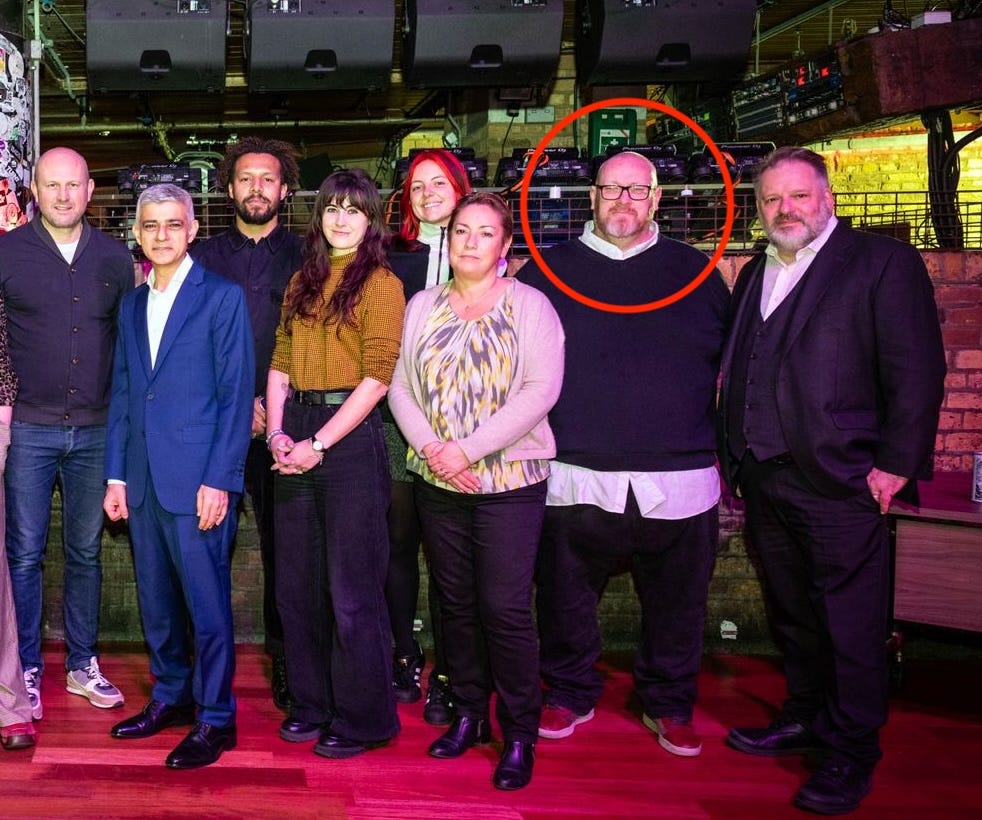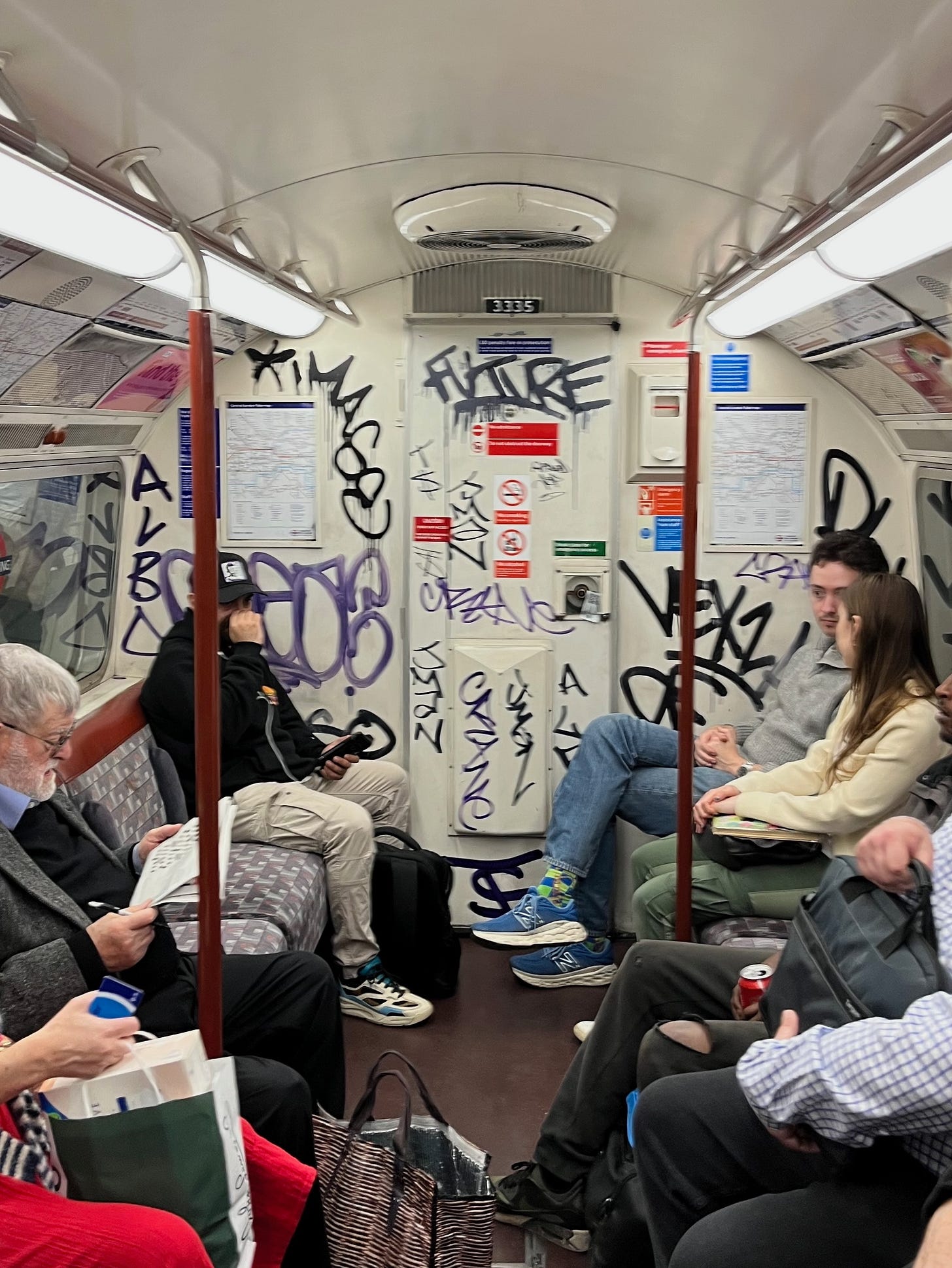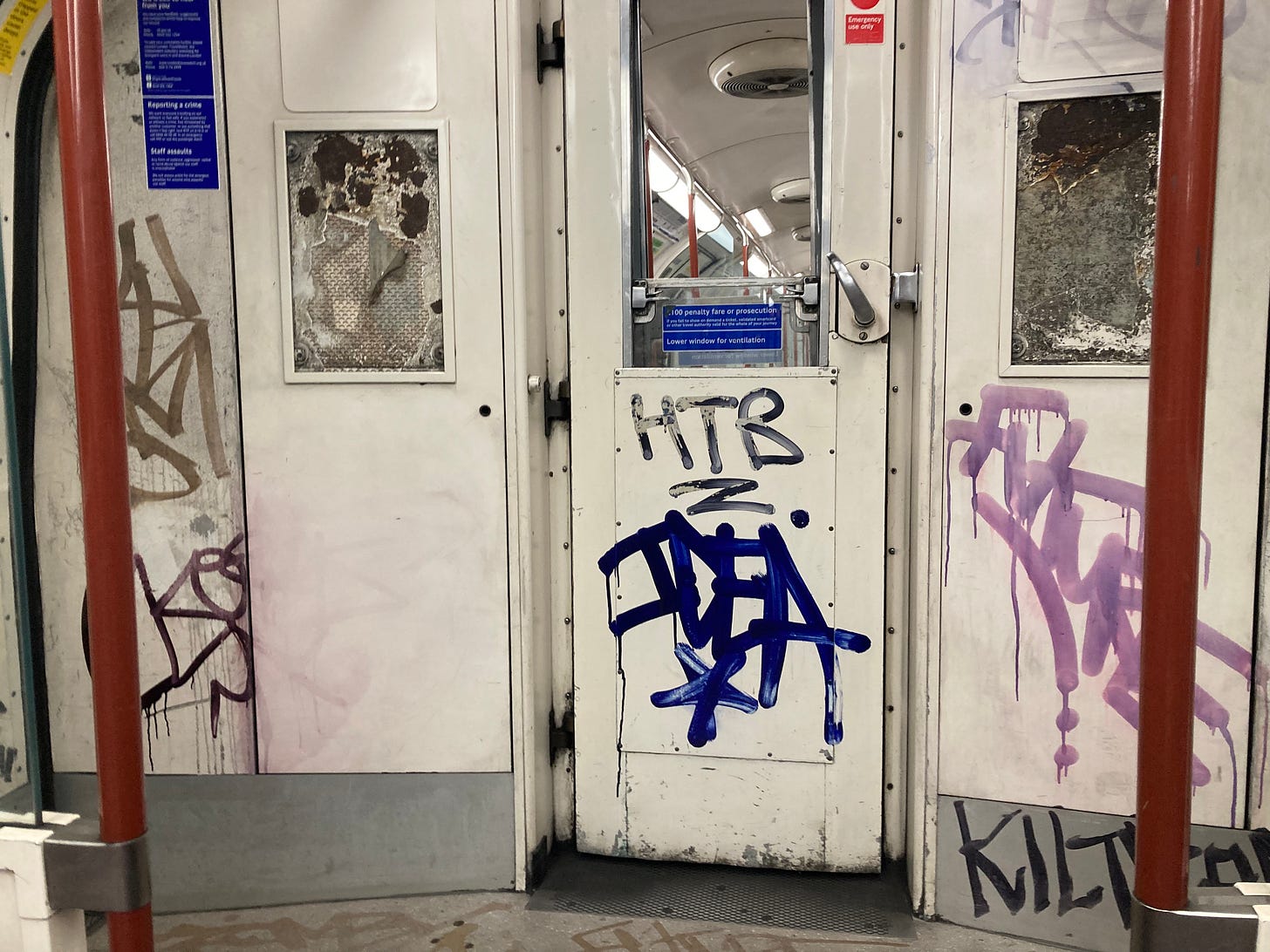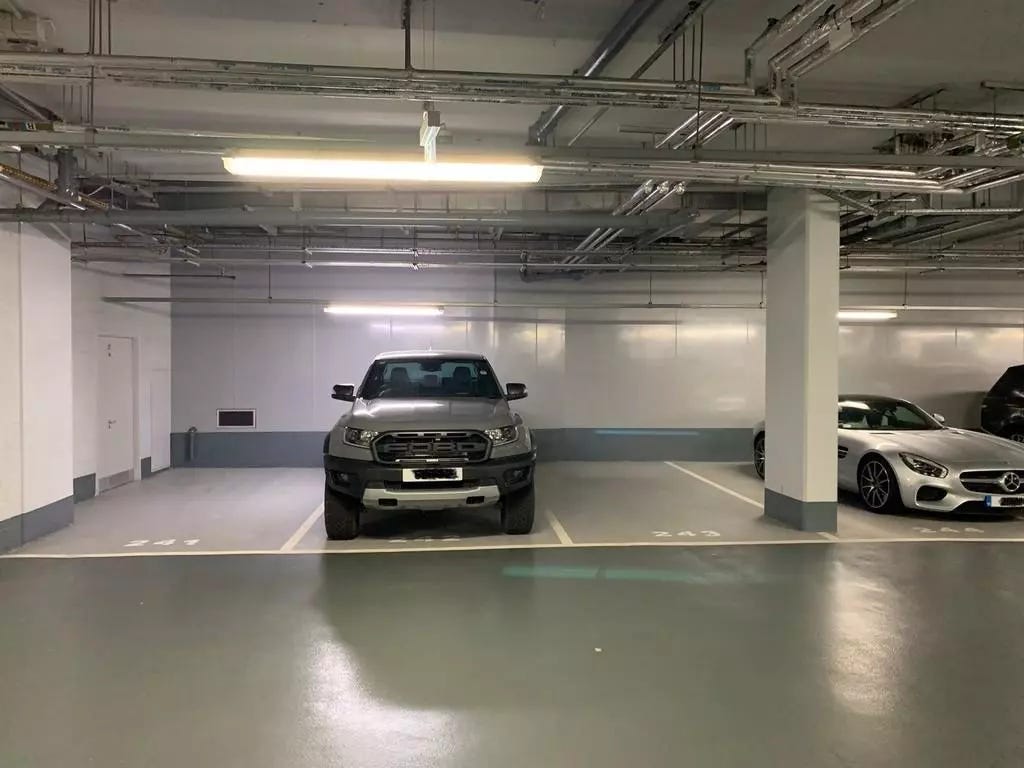The curious case of Sadiq Khan's new nightlife adviser
Plus: Is this London's most expensive car parking space, we hang around tube depots looking for graffiti so you don't have to, and the government is now investigating "Lime bike leg".
There was a big response to Saturday’s piece about London’s vigilante tube cleaners, and the political movement behind them. (The comments section is still very much alive and well worth checking out.)
A lot of people told us they wanted to know more about exactly why it is that London’s tube trains are suddenly covered in graffiti. Sometimes the simplest way to find out is just to ask – so today we have a chat with a tube maintenance worker, who explains it all.
Or scroll to the end for the intriguing story of one of the people tasked by Sadiq Khan with saving London’s ailing nightlife scene. He’s built a reputation as a leader in the sector thanks to the high-profile members of his lobbying organisation – but all may not be as it seems.
We’ve got a juicy members-only investigation coming up this Saturday — don’t miss out. Support local journalism and receive it straight to your inbox in time for weekend breakfast by signing-up now.
What’s actually behind the tube graffiti outbreak?
There’s been a lot of spin from press officers and political campaigners but we wanted to hear from the actual Transport for London staff responsible for fixing the problem.
London Centric spent a day hanging around the Bakerloo line depot in Stonebridge Park and speaking to the staff leaving work. What follows is what one particularly well-informed London Underground tube maintenance worker told us.
Graffiti on the line is “worse than it’s ever been”, he said, and the recent state of the trains was affecting staff morale. He was positive about the attention-grabbing graffiti-cleaning group for focusing media attention on the issue.
He also confirmed the official line that the main issue is that there aren’t enough spare trains to take the ones that need cleaning out of service. The Bakerloo trains were introduced in 1972, making them the oldest commuter rolling stock in the UK. Because Sadiq Khan has so far failed to get hundreds of millions of pounds from the Labour government for new Bakerloo trains, it’s likely that the existing ones will celebrate their 60th birthday in service — and they’re starting to fall apart.
Essentially, London is having to choose between a semi-reliable tube service or a clean tube service.
Graffiti inside the carriages
Internal graffiti tends to be done while the trains are in service carrying passengers up and down the line, said the maintenance worker. On the Bakerloo line, this typically occurs north of Queen’s Park station on the section of track towards Wembley and Harrow. This is because carriages empty out as the line runs out of central London, making it easier for surfaces to be tagged.
Some tags can be extremely hard to remove, as they are applied using shoe polish and leather dye that “eats into the paint work and the metal work”. Some people are even starting to tag the carriages’ vinyl floor, the employee added. The internal tags are “very repetitive”, he said, implying a small group of repeat perpetrators are responsible for most of the tags.
“HTB”, which seems to be the tag of a graffiti crew titled HostileTakeBack, was identified by the worker as by far the “most prominent tag”. This fits with photos collected by London Centric while travelling on the line.
The lack of CCTV seems to be the reason why the insides of Bakerloo and Central trains are so badly targeted while others escaped unscathed. The Central line is slowly getting this introduced as part of a £500m upgrade plan but there are no plans to do the same on the Bakerloo.
Graffiti on the outside of trains
External graffiti happens at the depot, the maintenance worker said, with “small gangs” trespassing on the site. As a result, the graffiti “tends to be on one specific end of the train and on one side.” The vandalism mostly occurs during weekends, Bank Holidays and strikes, when the depot has a “skeleton staff”.
Bakerloo trains are not the only targets at the north west London depot, which is shared with Avanti West Coast. An Avanti worker said that their trains are also often vandalised, but “if any of our trains get graffitied overnight, we don’t put them out”.

A recent track defect, now fixed, that prevented access to the depot’s automatic train wash – essentially a giant drive-through car wash but for trains – meant that the outside of all trains had to be cleaned by hand, further hindering the removal of external graffiti.
The Bakerloo maintenance worker expressed his shock at “how brazen [the graffiti] is”, boosted by social media videos on Instagram and TikTok showing people what’s possible and how to access the trains. Perpetrators increasingly enter the depot during daylight hours, he said. The worker claimed the depot’s security workers are hesitant to restrain any perpetrators that they see in case they get accused of assault, while station staff witnessing vandalism are fearful in case those responsible “pull out a blade”.
“London Underground recognise the problem,” he stated emphatically, explaining that ABM, the American company contracted to clean the TfL network, is hiring “a lot more staff to work nights to cover this” and clean trains before they go out again in the morning.
Ultimately, cleaning simply addressed the symptoms, not the root cause, he said. “You give a graffiti artist a blank space, it’s like catnip to a cat”.
Got a story for London Centric? Get in touch via WhatsApp or email, or leave a comment.
Preposterous Property of the Week
Can’t afford to buy your own London flat? The capital’s property market getting you down? Want to live next to Harrods? Why not buy this luxurious car parking space in the 199 The Knightsbridge development, which has just been listed for sale for a mere £250,000 and was flagged by a keen London Centric reader.
According to the estate agents the space is 5.6 metres in length, meaning it “would accommodate any vehicle”. This makes it the perfect place to park your oversized truck — or a sports car that you’ve just had flown in from Dubai so you can spend the summer loudly revving its engine in west London while stuck behind a bus.
Alternatively, why not just buy the 150 square foot parking space which comes with “ultra-fast” wifi, stick a mattress in the back of a van, park up there, and see how long you last. Anyone who purchases the parking space will, of course, have to pay a modest service charge to the building’s management of just £3,500 a year.
“Lime leg” makes it to the House of Lords
London Centric’s reporting on the safety of Lime e-bikes was raised in the House of Lords on Tuesday by Liberal Democrat peer Baroness Pidgeon, aka the artist formerly known as London Assembly Member Caroline Pidgeon.
She raised the issue of how the capital’s surgeons are increasingly referring to “Lime leg” for severely broken bones resulting e-bike injuries. That makes it just over three months between the term first appearing in this publication and it popping up in the official record of parliament.
Lime is a private Californian company backed by Uber and valued at billions of dollars. Yet despite its soaring revenues in London, it is still unwilling to take the financial hit of removing e-bikes from the streets when its users report many common faults.
Pidgeon’s particular concern was Lime’s insurance policy, with the company currently requiring users to suffer a severe permanent disability such as “complete loss of a kidney” or a thumb before it will pay out. (We’d rather not think about how you’re supposed to lose a kidney riding a Lime bike.)
As a result, growing numbers of people are suing Lime in the civil courts for damages caused by allegedly faulty bikes.
Transport minister Lord Hendy, formerly plain old “Peter Hendy, the boss of Transport for London”, said he and his civil servants have also been reading London Centric ‘s coverage. As a result they are concerned “that these bikes apparently seem to cause so many breaks of the lower limbs”. He promised Pidgeon a response on whether the company’s current level of insurance is up to scratch. Perhaps more intriguingly, he promised to talk with Lime “about the design of its bikes and the damage that they seem to cause on a regular basis”.
What if rental e-bikes didn’t incentivise people to jump red lights?
Bolt, the Uber rival app, has announced it is launching its own e-bikes in London this summer, adding to the tens of thousands already on the street. Its pitch is that it will be responsible and offer to charge users by distance rather than by the minute, removing the incentive to dash and run red lights.
How this will work in practice and exactly what the cost will be remains to be seen — the company was unable to provide a representative for an interview so we could actually understand their business model.
The curious case of Sadiq Khan’s nighttime adviser

When Amy Lamé stepped down as Sadiq Khan’s night czar last autumn, following a torrid stint in the job, the mayor decided not to replace her. Instead he appointed a new Nightlife Taskforce of industry representatives to come up with a series of recommendations on how he should revive the capital’s nightlife, which was in a beleaguered state even before the crisis wrought by Covid.
One of the most prominent and best-connected people appointed to Khan’s panel was Michael Kill, the chief executive of the Night Time Industries Association (NTIA), a lobby group which speaks on behalf of British clubs and bars. Kill describes himself the “national figurehead for the UK's night time industries” and is regularly quoted in coverage as an expert on the capital’s nightlife.
The NTIA is one of the UK’s best-connected industry groups, meeting UK government ministers at least 37 times since 2020. It even funds its own all-party parliamentary group, with Kill deriving his influence from the status of its members.
Now an investigation by London Centric and Democracy for Sale has raised questions about some of the claims Kill has made about himself and his organisation.
We found:
More than a dozen venues and companies listed as members by Kill’s organisation say they aren’t actually members. They include major industry players such as Ticketmaster and Amazon Music, who confirmed they aren’t involved despite being named on the site.
Kill claimed that he had been appointed as an “official representative to the United Nations”, something the United Nations denies.
Kill’s doctorate, which has been used by him in media appearances, is an honorary award from Appleton Private University. This obscure educational institution offers AI-led remote learning courses in the Metaverse, with its physical presence a small rural office in the US mountain state of Wyoming.
The inner workings of the NTIA and who funds it are opaque, with the organisation led by Kill and his wife. Until recently it had a lengthy list of members on its website, which was deleted after we began asking some of those listed whether they were part of the organisation.
Alex Proud, the London club owner who was recently questioned by London Centric over allegations relating to £500,000 of Covid grants, is a former director of the NTIA. The organisation’s current board includes Sacha Lord, who served as Greater Manchester Mayor Andy Burnham’s night-time economy adviser. Lord stepped down earlier this year after his events business was ordered to repay a £400,000 Covid grant following an investigation by the Manchester Mill.

Kill has a particularly close relationship with Broadwick Live, the major London promoter behind the 15,000-capacity Drumsheds in Enfield, which has a claim to be the world’s biggest nightclub.
When the venue hit the headlines earlier this year, following two suspected drug deaths and a stabbing, Kill publicly defended the venue’s operations in the media. What was not mentioned by Kill is that he is also a trustee of Nine Point Eight — a registered charity which, thanks to an unusual deal first reported by London Centric, technically owns Drumsheds.
When not serving on Khan’s Nightlife Taskforce, Kill has recently been appointed to the newly established position of Dean of Faculty for Nightlife Studies at Appleton Private University — the same organisation that gave him the honorary doctorate.
Appleton Private University doesn’t have a campus and is led by a Barcelona resident who calls himself Lord Jose Manuel Mosquera Castelo. Castelo is not a member of the aristocracy but instead purchased a British manorial title from a private company and declared himself the 30th Lord of Appleton or Westhall, a small village in North Yorkshire.
Other claims Michael Kill has made about his professional credentials are also open to questioning. Earlier this year, the member of Sadiq Khan’s Nightlife Taskforce announced on LinkedIn that he and the International Nightlife Association (of which he is vice president and shares connections with Appleton Private University) had been appointed an “official representative to the United Nations”.
This claim was based on gaining membership of the “conference of non-governmental organizations in consultative relationship with the United Nations” (CoNGO), a group that is open to non-governmental organisation from around the world. But being a member does not confer any official status at the United Nations. Sources at CoNGO became concerned that Kill was implying that their nominal membership of the group had given it a status within the United Nations that it didn’t possess.
In May, officials contacted the International Nightlife Association asking for documents that confirmed its UN status, while emphasising that UN status can only be granted by the UN. The International Nightlife Association never responded.
A United Nations spokesperson told us: “On recommendation of the CoNGO president the CoNGO Board has withdrawn the membership of [International Nightlife Association] in CoNGO without prejudice to reapplying once it meets the requirements for CoNGO membership.”
The post remains up on Kill’s LinkedIn, where he describes himself as being “recognised nationally and internationally as an early adopter, innovator and shaper of the future of nightlife.” It’s that reputation and the reputation of his organisation’s members that earned him a place on Sadiq Khan’s Nightlife Taskforce. With hundreds of thousands of Londoners working in the sector, and many more enjoying it as a key part of the city’s ecosystem, the pressure is on for him to deliver.
Got a story for London Centric? Get in touch via WhatsApp or email, or leave a comment.







I derive satisfaction while reading pieces like this just from imagining the blind panic they cause City Hall, as mediocre comms top brass blow a fuse and chase around after each other trying to agree some bland non-response
Reading this article about the damage graffiti causes, I'm reminded of how the March edition of Big Issue was a "takeover" by 10 Foot, a posh kid who comes from the Isle of Wight and gets his kids cosplaying as an urban outsider and sticking-it-to-the-man by graffitiing (amongst other things) my council estate, our local halal butcher and a nearby charity shop.
I suspect it won't stop the problem, but we can help counter the scourge of graffiti by stopping glamorising it as "outsider art", and calling its practioners what they are: selfish bellends who trash ordinary working people's stuff for their own amusement.
HTB, 10 Foot and the rest are just the Bullingdon Club with better PR.